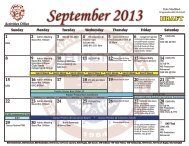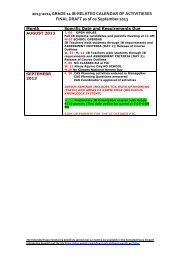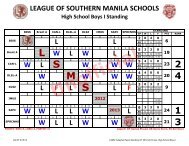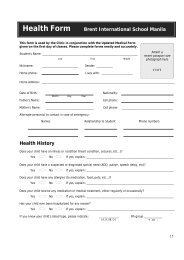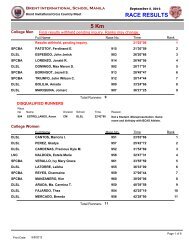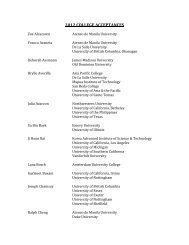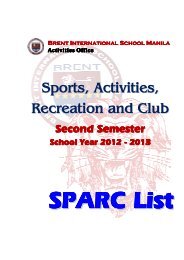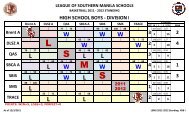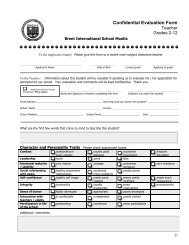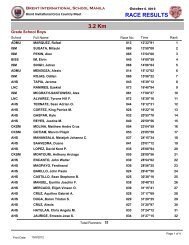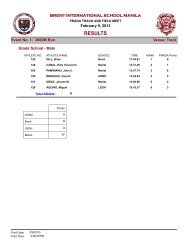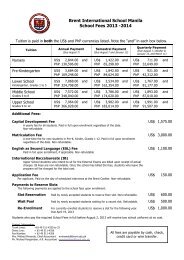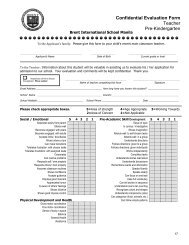Parent Orientation
Parent Orientation
Parent Orientation
Create successful ePaper yourself
Turn your PDF publications into a flip-book with our unique Google optimized e-Paper software.
Welcome <strong>Parent</strong>s and<br />
Grade 10 Students<br />
IB <strong>Orientation</strong><br />
12 February 2014<br />
Media Center
“The work is exciting at times, laborious at others,<br />
but always challenging. Outside of the office (a true<br />
legacy of Brent), I've learned to get involved in a wide<br />
variety of activities which include: Skulling on the<br />
river Itchen, playing Rugby for the local Trojan Club<br />
and exploring the UK. So far I've been to the Fringe<br />
Festival in Edinburgh, The Highland games in Crieff<br />
and have been through New Forest by bike…The IB<br />
gives you the flexibility to make projects interesting<br />
to you personally; take advantage of that! Learn to be<br />
independent as you study, you'll stumble more than<br />
you succeed at first but after a while you'll catch on to<br />
ideas much faster... To keep your sanity during IB,<br />
learn to prioritize your work. ” Alex MacLaren.<br />
Class of 2005. Imperial College
<strong>Orientation</strong><br />
Mission Statements<br />
Video c/o of Ben Jance IV and Alaaddin Ismail<br />
What is the IB Diploma Programme?<br />
The IB Learner Profile<br />
Academic Honesty<br />
The New Curriculum Model<br />
The Curriculum<br />
Sample of DP course combinations<br />
The Course Selection Form<br />
Qualifications-visit also individual university websites for pre-requisites<br />
Websites<br />
Breakout Sessions: Students stay in the Media Center with Ms Pozon<br />
and the Seniors<br />
<strong>Parent</strong>s please proceed to the US Faculty workroom with Mr Atkins, Ms<br />
Bustamante, Mrs Lindsay, and Mr Maldonado
The mission statement of all Brent Schools:<br />
“Brent Schools, in a Christian ecumenical environment in the Philippines, are committed<br />
to develop individual students as responsible global citizens and leaders in their<br />
respective communities, with a multicultural and international perspective, and equipped<br />
for entry to colleges and universities throughout the world.”<br />
******************************************************<br />
The IBO mission statement<br />
“The International Baccalaureate Organization aims to develop inquiring, knowledgeable<br />
and caring young people who help to create a better and more peaceful world through<br />
intercultural understanding and respect.<br />
To this end the IBO works with schools, governments and international organizations to<br />
develop challenging programmes of international education and rigorous assessment.<br />
These programmes encourage students across the world to become active,<br />
compassionate and lifelong learners who understand that other people, with their<br />
differences,can also be right.”
The IB Learner Profile<br />
IB learners strive to be:<br />
inquirers<br />
knowledgeable<br />
thinkers<br />
communicators<br />
principled<br />
open-minded<br />
caring<br />
risk-takers (courageous)<br />
balanced<br />
reflective
Academic Honesty Policy at Brent<br />
Principled<br />
Integrity<br />
Zero Tolerance<br />
A request for consistency in citations<br />
Support the child not the misdeeds
What is the IB Diploma Programme?<br />
The IB Diploma Programme is a rigorous, challenging college preparatory<br />
program studied in the last two years of high school (usually for ages 16-19).<br />
Students need to participate in at least three higher level courses (240 h) or a<br />
maximum of four HL courses (very tough). Students must also have in their<br />
diploma package three standard level courses (150 h). [3HL+3SL or 4HL + 2SL]<br />
Three core courses are required: Extended Essay, Theory of Knowledge, and<br />
Creativity, Action, Service (CAS).<br />
The circular model best explains the model of the curriculum.<br />
<br />
The IBDP curriculum is a process and not reduced to GPA.
Group 1 Studies in Language and Literature:<br />
Language A: Literature<br />
Literature course studied in the first language of the student or<br />
the language in which the student is most competent.<br />
“Mother tongue,” “native language,” “home language,”<br />
“language of one’s dream”<br />
Brent’s offerings:- both at higher and standard levels<br />
English<br />
Korean<br />
Filipino<br />
School supported languages or self-taught languages only at<br />
the standard level<br />
May 2012 Entries: Japanese A1 SL and Norwegian ST/SL<br />
(Two Languages A=Bilingual diploma)
Group 1 Studies in Language and Literature:<br />
Language A: Language and Literature<br />
This course is designed for students with “varied language<br />
profiles and maybe multilingual. The course offers an<br />
opportunity for continued language development and<br />
skills.”<br />
Important target skills:<br />
1. Textual Analysis<br />
2. Expression of literary appreciation<br />
We offer:<br />
English A: Language and Literature<br />
HL and SL
Group 2-Studies in Language Acquisition<br />
The main emphasis of the Modern language courses is on<br />
language acquisition and usage.<br />
Group 2 language choices range from the comparatively<br />
elementary, practical use to expressive and intellectual<br />
domains.<br />
Target skills: listening, speaking, reading, and writing<br />
Language B-practical and social, to expressive and intellectual<br />
domains<br />
Language Ab Initio (from the beginning)-NO PREVIOUS<br />
KNOWLEDGE OF THE TARGET LANGUAGE-practical utility
Group 2 continuation<br />
Language B offerings: mostly SL and depending upon<br />
teacher’s recommendation and university pre-requisite,<br />
students may be allowed to do higher level<br />
English<br />
French<br />
Mandarin<br />
Spanish<br />
Language Ab Initio<br />
French<br />
Mandarin<br />
Spanish
Group 3 Individuals and Societies<br />
The aims of all subjects in Group 3, Individuals and Societies, are to:<br />
encourage the systematic and critical study of: human experience and<br />
behavior; physical, economic and social environments; the history and<br />
development of social and cultural institutions<br />
<br />
develop in the student the capacity to identify, to analyze critically and to<br />
evaluate theories, concepts and arguments about the nature and activities of<br />
the individual and society<br />
enable the student to collect, describe and analyze data used in studies of<br />
society, to test hypotheses, and to interpret complex data and source material<br />
promote the appreciation of the way in which what has been learned is relevant<br />
to both the culture in which the student lives and the culture of other societies<br />
develop an awareness in the student that human attitudes and opinions are<br />
widely diverse and that a study of society requires an appreciation of such<br />
diversity<br />
<br />
enable the student to recognize that the content and methodologies of the<br />
subjects in Group 3 are contestable and that their study requires the toleration<br />
of uncertainty.<br />
IBO business and Management Guide, March 2007
Group 3 Subject Offerings<br />
• Business and Management- HL and SL<br />
Economics- HL and SL<br />
Geography-HL and SL<br />
History- HL and SL<br />
Information Technology in a Global Society- HL and<br />
SL<br />
Psychology- HL and SL
Group 4 Sciences<br />
Through studying any of the group 4 subjects,<br />
students should become aware of how scientists<br />
work and communicate with each other. While the<br />
“scientific method” may take on a wide variety of<br />
forms, it will generally involve the formation, testing<br />
and modification of hypotheses through observation<br />
and measurement, and under the controlled<br />
conditions of an experiment. It is this approach,<br />
along with the falsifiability of scientific hypotheses,<br />
that distinguishes the experimental sciences from<br />
other disciplines and characterizes each of the<br />
subjects within group 4.<br />
IB Diploma Programme guide: Biology, March 2007
Group 4 Offerings- both HL and SL<br />
Biology<br />
Chemistry<br />
Physics<br />
Computer Science*<br />
Sports, Exercise and Health Science SL<br />
ONLY**
Group 5 Mathematics<br />
The following factors help teachers, students, and<br />
parents decide the Math course that best fits the<br />
individual:<br />
-own abilities<br />
-own interests<br />
-choice of subjects within the DP<br />
framework<br />
-academic plans<br />
-choice of career<br />
-university requirement<br />
-country requirement
Group 5 Mathematics<br />
“Scientists view Mathematics as a language that is central to the<br />
understanding of events that occur in the natural world.”<br />
Mathematics HL- designed for students with strong background in<br />
mathematics who are competent in a range of analytical and<br />
technical skills.”<br />
Mathematics SL*-designed for students with knowledge of basic<br />
mathematical concepts, and also equipped with the skills needed to<br />
apply simple mathematical techniques.<br />
Mathematical Studies SL-designed for students with varied<br />
background and abilities. It is designed to build confidence and<br />
encourage an appreciation of maths in students who do anticipate a<br />
need for maths in their future studies.<br />
Group 5 Elective course-Computer Science HL and SL- For the<br />
purpose of course groupings, Computer Science falls under group 5<br />
but it will never replace a Maths course.<br />
IB Mathematics Subject Guide September 2006
Group 6 The Arts and Elective<br />
A sixth subject is required to complete the hexagon. Offerings in the arts group are:<br />
Music HL and SL<br />
Theatre HL and SL<br />
Visual Arts HL and SL<br />
Visual Arts SL-A<br />
Visual Arts SL-B<br />
Other options for Group 6, the Electives<br />
Another Group 1<br />
Another Group 2<br />
Another Group 3<br />
Another Group 4
The CORE of the hexagon<br />
The Extended Essay<br />
The Theory of Knowledge<br />
Creativity, Action, Service
The Extended Essay<br />
The Extended Essay is a requirement for students to<br />
engage in independent research through an in-depth<br />
study of a question relating to one of the subjects they<br />
are studying. WWW.IBO.ORG<br />
40 hrs<br />
4000 words<br />
supervisor
The Theory of Knowledge<br />
Theory of knowledge is a course designed to encourage<br />
each student to reflect on the nature of knowledge by<br />
critically examining different ways of knowing (perception,<br />
emotion, language and reason) and different kinds of<br />
knowledge (scientific, artistic, mathematical and historical).<br />
www.ibo.org
EE -TOK Matrix effective May<br />
2010
CREATIVITY, ACTION, SERVICE<br />
(CAS)<br />
Creativity, action, service requires that students<br />
actively learn from the experience of doing real tasks<br />
beyond the classroom. Students can combine all three<br />
components or do activities related to each one of them<br />
separately. www.ibo.org
EIGHT LEARNING OUTCOMES OF CAS<br />
Students should provide evidence that they have<br />
1. Increased their awareness of their own strengths and<br />
areas for growth<br />
2. Undertaken new challenges<br />
3. Planned and initiated activities<br />
4. Worked collaboratively with others<br />
5. Shown perseverance and commitment in their activities<br />
6. Engaged with issues of global importance<br />
7. Considered the ethical implications of their actions<br />
8. Developed new skills
Student Options at Brent<br />
Brent Diploma-accepted and recognized worldwide<br />
Brent Honors Diploma (at least GPA of 3.00)<br />
Brent Diploma + IBDP course<br />
Brent Honors/Diploma+ IB”full” DP
Who can be an IB Diploma Programme student at<br />
Brent?<br />
The IBDP at Brent is an equal opportunity program that<br />
considers parent-student decisions.<br />
GPA- 3.30 or better<br />
Some courses require minimum grade requirement in<br />
English and Mathematics<br />
Teacher recommendation<br />
University Pre-requisite<br />
Country Pre-requisite
Who can be an IB Diploma Programme course<br />
student at Brent?<br />
Students in HL classes, and individually TOK, EE, CAS<br />
(starting 2012 for first exam in 2014)<br />
<strong>Parent</strong> and/or students decide to sit either one or more<br />
subjects for examination<br />
As needed
Who will most likely to succeed in the<br />
IBDP?<br />
Students who set realistic goals<br />
Students who choose level-appropriate courses.<br />
Students who “self-regulate.”<br />
Self- and Peer-assessments<br />
Self-directed<br />
Time management skills<br />
Interests
Why IB diploma?<br />
Universities know the rigor of the program and put<br />
value on students who love to challenge themselves.<br />
Most universities now consider the predicted grades and<br />
IB diploma in place of SAT. (NYU-AD, NYU system, top<br />
HK and Singapore universities)<br />
Yonsei University considers strong GPA and IB grade of<br />
36.<br />
It is education for life!
The Hexagon Model<br />
English A: Literature<br />
Korean A: Literature<br />
Pilipino A: Literature<br />
English A: Language and Literature<br />
Spanish A: Language and Literature<br />
Self-Taught Languages SL ONLY<br />
English B<br />
French B<br />
Mandarin B<br />
Spanish B<br />
French Ab Initio<br />
Mandarin Ab Initio<br />
Spanish Ab Initio<br />
Business and Management<br />
Economics<br />
Geography<br />
History<br />
Information Technology in a<br />
Global Society (ITGS)<br />
Psychology<br />
Biology<br />
Chemistry<br />
COMPUTER<br />
SCIENCE<br />
Physics<br />
Sports, Health and<br />
Exercise Science<br />
SL ONLY<br />
Mathematics HL<br />
Mathematics SL<br />
Mathematical Studies SL<br />
Music Another Group 3<br />
Theater Another Group 4<br />
Visual Arts<br />
Another Group 1<br />
Another Group 2
A general liberal arts<br />
combination<br />
Three HL’s<br />
English A HL Group 1<br />
History HL Group 3<br />
Visual Arts HL Group 6<br />
Three SL’s<br />
Spanish B SL Group 2<br />
Biology SL Group 4<br />
Maths Studies SL Group 5<br />
EE in English A1 EE<br />
ToK<br />
CAS<br />
TK
Applied Science Course (UBC)<br />
Three HL’s<br />
English A HL Group 1<br />
Economics HL Group 3<br />
Chemistry HL Group 4<br />
Three SL’s<br />
Mandarin SL Group 2<br />
Math SL Group 5<br />
Physics SL Group 6<br />
EE<br />
ToK<br />
CAS-
Three languages in the diploma<br />
Four HL’s<br />
English A1 HL Group 1<br />
Spanish B HL Group 2<br />
Mandarin B HL Group 6<br />
Economics HL Group 3<br />
Two SL’s<br />
Physics SL Group 4<br />
Math SL Group 5<br />
EE<br />
ToK<br />
CAS<br />
TK<br />
EE
Business**<br />
Three HL’s<br />
English A1 HL Group 1<br />
Economics HL Group 3<br />
Computer Science HL Group 5<br />
Three SL’s<br />
Spanish Ab Initio Group 2<br />
Physics SL Group 4<br />
Maths SL Group 5<br />
EE<br />
TOK<br />
CAS
The Pre-Registration Form
Student Working Template<br />
My choice is<br />
HL/SL<br />
My choice is<br />
HL/SL<br />
My choice is<br />
HL/SL<br />
My choice is<br />
My choice is<br />
HL/SL<br />
HL/SL<br />
My choice is<br />
HL/SL
Universities in the USA<br />
Brent GPA<br />
SAT 1/2<br />
TOEFL<br />
ACT<br />
Personal Statement<br />
Recommendation letters<br />
IB or AP for advanced placement credits-IBHL grade of 5,<br />
6, or 7 in some universities; some will take the<br />
composite IB scores, then review HL grades of 5, 6, or 7.<br />
Request of IB results service: 1 July (only ONE universityfirm<br />
offer)
Canadian Universities<br />
Brent GPA<br />
At times SAT 2 results<br />
TOEFL<br />
IB Diploma results for advanced placement<br />
credits<br />
IB Estimated grades<br />
Student Supplementary form (UBC-Business<br />
courses)<br />
Request of Results Service: 1 July (can be as<br />
many as three)
UK universities<br />
UCAS<br />
Letter of Reference<br />
IB Estimated grade (total)<br />
Personal Statement<br />
Transcript of Records<br />
Request of Results Service-1 May (as many as FOURcheck<br />
www.ucas.ac.uk)<br />
Conditional offers
Australia/New Zealand<br />
Letter of Reference<br />
Transcript of Records<br />
TOEFL<br />
IB Diploma<br />
Foundation year<br />
Some universities like Uni of Sydney and Monash U<br />
accept entry in July (based on predicted grades)<br />
Request for Results service: 15 October
A SAMPLE OF A DIPLOMA: SCORE 24
A SAMPLE OF SCORE 24:DIPLOMA NOT AWARDED
A SAMPLE OF A CERTIFICATE
The Bilingual Diploma<br />
2 Languages A<br />
Groups 3 or 4 subject taken in a language<br />
other than the candidate’s Language A with<br />
at least a grade of C or satisfactory<br />
EE in groups 3or 4 subject written in a<br />
language other than the candidate’s<br />
Language A with at least a grade of C or<br />
Satisfactory
What graduates say about the IB<br />
“The workload is moderately heavy. Sure, we have essays<br />
and tests here and there, but the real killer is the reading.<br />
Assigning a book to read over a weekend is a totally normal<br />
occurrence. I would definitely say that IB has accustomed me<br />
to the workload, though. While we do have more work here in<br />
college, I would surmise that the IB curriculum made me<br />
accustomed to heavy workloads and analytical thinking which<br />
is what college is all about.” Kris Munden Class of 2007<br />
Boston College<br />
Although University is good, since there is a lot more<br />
independence involved, I really miss Brent. The other day I got<br />
told off by one of the science desk advisors saying that she<br />
wouldn't check if a certain class was full (i.e. "Nope! Go check<br />
it yourself") because I could check it on my own. She was<br />
right, but I'm sure advisors and teachers at Brent would be<br />
more accommodating (hehe). My classmates are really<br />
friendly, and although they're extremely intelligent, they won't<br />
hesitate to help each other if we want to check HW. I find the<br />
atmosphere, at least in the peer-to-peer level is a lot like<br />
Brent. Philip Mar Class of 2007 UBC major in Honours<br />
Physics and Astronomy
What graduates say…<br />
One thing that I wish I focused more on in high school, is taking<br />
risks in the classes that I picked and also paying more attention to<br />
my inclinations. In the end, it wasn't so much the mark that I<br />
got, I realized that its more on what I learned about myself and<br />
what makes my heart race- whether its photography or computer<br />
science..."take a chill pill (or two)" - Audrey Young '05 UBC<br />
“The work is exciting at times, laborious at others, but always<br />
challenging. Outside of the office (a true legacy of Brent), I've<br />
learned to get involved in a wide variety of activities which<br />
include: Skulling on the river Itchen, playing Rugby for the local<br />
Trojan Club and exploring the UK. So far I've been to the Fringe<br />
Festival in Edinburgh, The Highland games in Crieff and have been<br />
through New Forest by bike…The IB gives you the flexibility to<br />
make projects interesting to you personally; take advantage of<br />
that! Learn to be independent as you study, you'll stumble more<br />
than you succeed at first but after a while you'll catch on to ideas<br />
much faster... To keep your sanity during IB, learn to prioritize<br />
your work. ” Alex MacLaren. Class of 2005. Imperial College
Help your child make realistic and attainable career<br />
choice.-This will help in the appropriate course and level<br />
placements of your child. Our GOAL: LEVEL<br />
APPROPRIATE courses<br />
Support and nurture their talent.<br />
Appreciate the individual differences of your children.<br />
Talk to their guidance counselors.<br />
Interest, motivation, and keeping informed all the time<br />
can help your children make the best decisions in their<br />
career path.
Three more subject orientations<br />
Tuesday, 18 February 2:40-3:30<br />
Biology with Mrs Yap room S413<br />
Wednesday, 19 February 2:40-3:30<br />
Psychology with Ms Monzon S307<br />
Thursday, 20 February 2:40-3:30<br />
Sports, Health and Exercise Science with Mr<br />
Lefebvre at the Upper School Faculty<br />
Workroom S101
Websites<br />
www.ibo.org<br />
www.brent.edu.ph>IB>subject guide<br />
References:<br />
IB Subject Guides
Break out Session<br />
<strong>Parent</strong>s, please proceed to the upper school faculty<br />
workroom with Mr Atkins, Mrs Levno, and Mr Compton.<br />
Grade 10 students, please remain in the Theater and<br />
join a Grade 12 student to lead your group discussion.<br />
Each senior will lead 6-7 grade 10 students per group.
Break out session groupings
GRADE 10 IB SUJECT SPECIFIC ORIENTATION SESSIONS <br />
for Batch 2016 <br />
Date Time Subject Teacher/s Place <br />
Monday, <br />
18 <br />
November <br />
2:40-‐<br />
3:30 <br />
English A: <br />
Literature <br />
Mr J Nolan <br />
Mr E Pangiraj <br />
U203 <br />
Tuesday, <br />
19 <br />
November <br />
Wednesday, <br />
21 <br />
November <br />
Monday, 25 <br />
November <br />
And <br />
Tuesday, <br />
26 <br />
November <br />
(Depending <br />
on Day 1 or <br />
Day2 class <br />
meetings) <br />
Wednesday, <br />
27 <br />
November <br />
and <br />
Thursday, 28 <br />
November <br />
Monday, <br />
2 December2 <br />
Tuesday, <br />
3 December <br />
Tuesday <br />
10 December <br />
Wednesday <br />
11 December <br />
Thursday, 12 <br />
December <br />
Tuesday, <br />
22 <br />
January <br />
2013 <br />
Monday <br />
27 January <br />
2014 <br />
2:40-‐<br />
3:30 <br />
English A: <br />
Language and <br />
Literature <br />
Mrs Brown <br />
Mr Sinclair <br />
2:40-‐<br />
3:30 English B Mr Kailan Leung <br />
Mrs Brown <br />
Within <br />
class <br />
blocks <br />
2:40-‐<br />
3:30 <br />
U 201 <br />
U204 <br />
Korean A: Mrs Kyung Lee U401 <br />
Literature <br />
Mrs J Lee <br />
Pilipino A: <br />
Literature Mr Jessie Setubal M401 <br />
French B <br />
Mandarin B <br />
Spanish B <br />
French Ab Initio <br />
Mandarin Ab <br />
Initio <br />
Ms N Le Saux <br />
Mr Xuanqing Zhang <br />
Mr Jorge Boatas <br />
Mr Noel Bugarin <br />
Ms N Le Saux <br />
Mr Xuanqing Zhang <br />
M402 <br />
U403 <br />
U405 <br />
U405 <br />
M402 <br />
U403 <br />
2:40-‐<br />
3:40 <br />
Spanish Ab Initio Mr Noel Bugarin U404 <br />
2:40-‐<br />
3:30 Theater Mr Elish Pangiraj S214 <br />
2:40-‐<br />
3:30 Music Mr Paul Leggatt S400 <br />
2:40-‐<br />
3:30 Visual Arts Ms Joy Cachola S112 <br />
2:40-‐ Computer <br />
3:30 Science Mr R Castaneda S315 <br />
2:40-‐ Business <br />
3:30 Management Ms Grace Blancaver S301 <br />
2:40-‐<br />
3:30 Economics Mr Buensuceso S302 <br />
<br />
1
Tuesday <br />
28 January <br />
And <br />
Wednesday <br />
29 January <br />
2013 <br />
(Depending <br />
on Day 1 and <br />
Day 2 class <br />
meetings) <br />
Thursday, <br />
30 <br />
January <br />
Monday <br />
03 <br />
February <br />
Tuesday, <br />
04 <br />
February <br />
Wednesday <br />
05 <br />
February <br />
Thursday <br />
06 <br />
February <br />
Monday <br />
10 <br />
February <br />
Tuesday <br />
11 <br />
February <br />
Within <br />
Class <br />
Blocks <br />
Mathematics HL <br />
(During Math <br />
Methods Class) <br />
Mathematics SL <br />
(During Math <br />
Methods Class) <br />
Mathematical <br />
Studies (During <br />
Math Methods <br />
and Studies <br />
classes) <br />
2:40-‐<br />
3:30 Biology HL <br />
Mr Whalley (when <br />
available) <br />
Mr Burke <br />
Mr McDonald <br />
Mr Whalley (when <br />
available) <br />
Mr Burke <br />
Mr McDonald <br />
Mrs Prema Soosai-‐<br />
Thomas <br />
Ms Bustamante <br />
Mrs Britton <br />
Mr M Palmer <br />
Mrs S Yap <br />
U301 <br />
U305 <br />
U303 <br />
U301 <br />
U305 <br />
U303 <br />
U302 <br />
S412 <br />
2:40-‐<br />
3:30 Chemistry HL Mr R Radtke <br />
Mrs J Jance <br />
S413 <br />
2:40-‐<br />
3:30 Physics HL Mr J Carlson <br />
S408 <br />
Mr P Yap <br />
2:40-‐ Geography Mr A Barnes S306 <br />
3:30 <br />
2:40-‐<br />
3:30 <br />
2:40-‐<br />
3:30 <br />
2:40-‐<br />
3:30 <br />
Psychology Miss Imon Monzon S307 <br />
Information <br />
Technology in a <br />
Global Society <br />
Mr Andrew Fulo S314 <br />
History Mrs Elizabeth Zadoo S304 <br />
<br />
2
Date Time Subject Teacher/s Place <br />
1:10-‐<br />
2:35 <br />
Wednesday <br />
12 <br />
February <br />
TUESDAY <br />
05 MARCH <br />
Grade 10 <strong>Parent</strong>-‐<br />
Student IB <br />
orientation <br />
Mr Atkins <br />
Ms Bustamante <br />
Mrs Lindsay <br />
Mr Maldonado <br />
Ms K Pozon <br />
Grade 12 Students <br />
SUBMISSION OF THE COMPLETED PRE-‐<br />
REGISTRATION FORM <br />
MEDIA CENTER <br />
Mrs Lindsay’s <br />
and <br />
Mr Maldonado’s <br />
offices <br />
<br />
3



